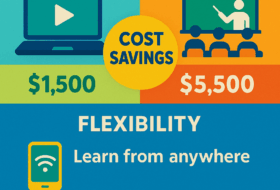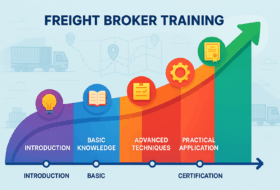How to Become a Freight Broker without experience.
Want to be a licensed freight broker and you want to know the requirement? If YES, here are 7 steps to How to Become a Freight Broker without experience.
What is the Average Salary or Income of a Truck Broker?
The amount of money you will earn as a freight broker differs from person to person depending on their situation.
Freight brokers who are managing their own freight business have a vaster earning potential when compared to their employee counterparts. A self-employed freight broker can generate a yearly income in the six figure range ($100,000 plus).
Step 1: Understand What a Freight Broker Does
Before diving in, clarify the role:
- Freight brokers act as intermediaries between shippers (companies needing goods transported) and carriers (trucking companies or owner-operators).
- They negotiate rates, manage contracts, and ensure compliance with federal regulations.
- No experience? Focus on transferable skills like communication, sales, and problem-solving. These are critical for building trust with clients and carriers.
Step 2: Research Legal Requirements
To operate legally, you’ll need:
- USDOT Number : Register with the Federal Motor Carrier Safety Administration (FMCSA) to obtain this unique identifier for your business.
- MC Number : Required to broker freight across state lines.
- Surety Bond : Secure a $75,000 BMC-84 bond (or a BMC-85 trust fund) to protect clients and carriers from financial loss.
- Business License : Choose a legal structure (LLC, sole proprietorship, or corporation) and register your business. An LLC is often recommended for liability protection.
Step 3: Invest in Freight Broker Training
While not mandatory, freight broker training accelerates your learning curve. Look for:
- Accredited courses (e.g., Transportation Intermediaries Association (TIA) certifications) that cover compliance, load negotiation, and carrier relationships.
- Online programs designed for beginners, offering modules on freight documentation, insurance requirements, and contract management.
- Platforms providing freight broker certification to build credibility with clients and carriers.
Step 4: Build a Business Plan
A solid plan is critical for success, especially when learning how to become a freight broker without experience :
- Define Your Niche : Focus on specific freight types (e.g., refrigerated, flatbed, or hazardous materials) to stand out.
- Budget : Account for licensing fees, bonds, software tools (like load boards), and marketing.
- Revenue Goals : Estimate earnings based on commission rates (typically 5–15% per load).
Step 5: Network with Industry Pros
Networking is key to overcoming the “no experience” hurdle:
- Join the Transportation Intermediaries Association (TIA) for access to resources, job boards, and industry events.
- Use load boards like DAT or Truckstop.com to connect with carriers and find available freight.
- Attend trade shows or webinars to meet shippers and seasoned brokers who can mentor you.
Step 6: Secure Startup Funds
If you need financing:
- Apply for small business loans or grants through local banks or government programs.
- Consider crowdfunding or partnerships with experienced brokers who can guide you.
- Leverage your business plan to pitch to investors or lenders.
Step 7: Launch and Scale Your Business
Start small and grow strategically:
- Begin brokering a few loads monthly while refining processes.
- Invest in dispatching software to automate tasks like rate calculations and invoice generation.
- Hire agents or expand into specialized freight types (e.g., oversized loads) as your business grows.
FAQs
Q1: Do I need a degree to become a freight broker?
A1: No formal education is required, but freight broker training is highly recommended for beginners.
Q2: How long does it take to get a freight broker license?
A2: Licensing typically takes 2–4 weeks after submitting FMCSA paperwork.
Q3: What’s the fastest way to learn how to become a freight broker without experience?
A3: Enroll in a reputable training program, network actively, and practice brokering small loads to gain hands-on experience.
Final Thoughts
Becoming a freight broker without experience is entirely achievable with the right strategy. By following these steps—researching requirements, investing in freight broker certification , and building strong relationships—you’ll position yourself for success. Focus on providing value, staying compliant, and continuously learning to grow your logistics business.
Ready to start? Explore our freight broker course to fast-track your journey and master how to become a freight broker without experience .





